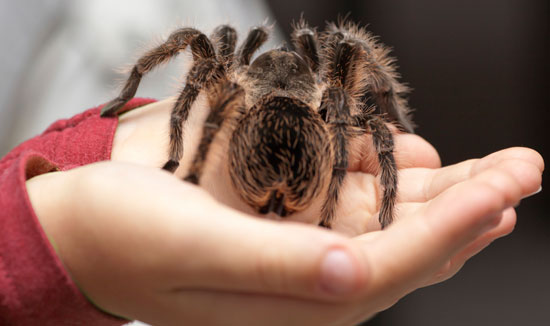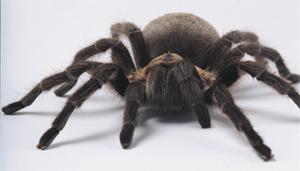How to Keep Spiders as Pets
Spiders can make fascinating pets. Here are a few steps to get you started keeping spiders.

Step 1: Catch a spider
Spiders are all around us, indoors and out, so they’re not hard to find. Some species can bite and a few are venomous. Learn about dangerous spiders in your area before heading out. It’s easy to safely catch a spider by using a small jar. Gently coax it into the jar using the lid. Spiders will eat each other, so keep only one per jar.
Step 2: Prepare a cage
Large spiders do well in the inexpensive plastic terrariums available from pet stores. Smaller ones can be kept in jars or plastic containers if air holes are drilled into the lid or sides. Be sure the holes are small enough to prevent escape.
Potting soil makes good cover for the cage bottom. Sticks, dead leaves or artificial plants provide structure for hiding, climbing and webbing.
Step 3: Water
Depending on the size of the spider, anything from a plastic bottle cap to a small bowl can serve as a water dish. Spiders also drink water sprayed on webbing, but you should never allow the cage to become damp.
Step 4: Feeding
Offer insect prey once or twice a week. Crickets are available from pet shops, or you can collect insects outdoors if no insecticides have been sprayed in the area.
Step 5: Observing
Watch your spider and take notes on its behavior. You won’t believe what happens in the spider’s web until you’ve visited it yourself!
PREFERRED PETS
 Not all spiders do well in captivity. Active hunters are usually easier to keep than web builders. Here are a few that make good pets.
Not all spiders do well in captivity. Active hunters are usually easier to keep than web builders. Here are a few that make good pets.
Tarantulas: Some species exceed 10 inches in legspan. They’re by far the most popular pet spiders and can be bought in pet stores.
Wolf Spiders: Some can be more than three inches in legspan. Large specimens do best in terrariums with lots of floor space.
Jumping Spiders: Although small and rarely exceeding half an inch, their jumping ability is amazing. Many species are brightly colored and can easily be kept in jars.
Fishing Spiders: In captivity, these large spiders appreciate vertically arranged pieces of bark for climbing. They’re very fast, so use caution when capturing them.
Grass Spiders: These spiders build funnel-shaped webs in grass, bushes and on buildings. In captivity, they will build extensive webs inside their cage.
LEARN MORE: Click here to see photos of a spider expert’s seven favorite spiders
By the way, my wolf spider is very large (legspan is about 3 – 3.5 inches in diameter, body is maybe about 1.5 inches long)and from Michigan. Thanks again!
I CAUT A SPIDER ABOUT 2 INCHES IN DIAMITER AND ITS POISINES AND ITS LOOSE SOWHAT SHOUL I DO????
I found a cool spider not sure if its male or female. But I think its a wolf spider.
when do I let it go?
hey if a spyder iz starvin wuld it eat itzelf?
i caught like 15 just 3 hours ago and i put soil some stick in some plastic cups for now my dad said hell let them all go if i mess with them any more so tomorrow ill feed them if there are still alive they are in a cooler all next to each other i wonder if they will survive
well girly girl you probably wont have to feed it for a few more days LithiumHearted it wont escape as long as you keep the lid on and when you make sure when you feed it its at the bottom eightlegs all it needs is some leaves for web and when its done making its web then give it small bugs like crickets framirez just crack the lid open a little bit and pop the bug in any more questions just ask sorry if my other replys werent sooner
Hi, i have 2 golden orb weavers that are both pregnant and i just moved 1 to a cage and working on one for the other. I was just wondering how many eggs they will have because their abdomens are huge.
my spider already made a web but the web is on the lid how am I going to put all the things in without her escaping?
look! what happend my spider killed his 100 babies his crazy!